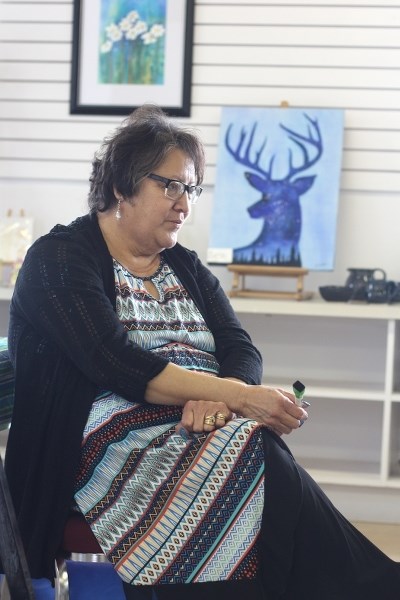Two area aboriginal women will be sharing the Cree culture and history, with the hope of strengthening relationships with non-aboriginal residents.
On Thursday, April 20, artist Lana Whiskeyjack and storyteller Alsena White, both of Saddle Lake Cree Nation, will be at the Bonnyville Municipal Library for a storytelling and beading workshop. They will be sharing first-hand accounts of the multi-generational impacts of Indian residential schools, as well as the resilience and culture of the Cree people.
Growing up, White spent 10 years in the residential school that formerly occupied Blue Quills College. Now, she shares her personal story of what it was like and the continued effects that experience has had on her life.
“I feel that people need to know what happened to us because it was always hidden, nobody talked about it. I want to share that history of what happened to us, because a lot of non-aboriginals don't know what happened to us,” explained White. “A lot of people think that we should just get over the pain and trauma we went through, but it's not just that easy. You can't just forget it.”
The Saddle Lake woman was inspired to share her experience after attending a session on residential schools, where the speaker hadn't gone through the system. She felt that the information would have a greater impact coming from someone like herself who had first-hand knowledge of what went on inside the walls of a school.
“It's important that they don't hear from an outsider, but a person that's actually been to school there... I want people to know what Canada did to the First Nations people. Everybody has their own story, so I'm sharing mine,” said White, adding that while the schools may be over, they're still felt by the people and their families who went through them.
“I wouldn't say I've gotten over it, because it still bothers me. You have the five senses in your body that are still effected: when you hear noises, when you smell something, when you feel – all those have been effected by residential schools... It's not just me, it's my children too. Hopefully it will stop by the grandchildren or great grandchildren.”
Joining White to host the educational workshop is her niece, Whiskeyjack. Raised on Elizabeth Métis Settlement but also from Saddle Lake Cree Nation, Whiskeyjack is an artist who is currently finishing her doctorate at Blue Quills College.
She will be facilitating the beading portion of the evening, explaining the history behind how beads became part of aboriginal culture.
“We actually talk about traditional arts; what came before beads and that when we started trading and received beads, how they became this new form of creating elaborate beadwork that you see on a lot of people's dancing regalia. We designed this workshop so you learn about the stories, and some of it is very emotional, so that's where the art comes in to help you process it and in healing.”
Also having a mother and grandmother impacted by residential schools, Whiskeyjack knows the importance of ensuring her aunt's powerful story gets heard. She believes the more Canadians as a whole understand residential schools and the Cree culture, the easier it will be to build an understanding and strengthen relationships.
“As an indigenous woman, there are a lot of bad, unhealthy statistics surrounding indigenous women. In order for me to create safer spaces for our vulnerable indigenous population, we need to create more understanding. Education is a powerful tool in building those bridges so people understand some of the stereotypes that surround indigenous people, those stereotypes are from a specific system of oppression.”
The workshop will run from 6 p.m. to 8 p.m. at the Bonnyville library. It's a free event, with beads being provided for the art project. Anyone interested in attending is asked to register with the library ahead of time.
“A lot of people don't have access to hearing these stories in person, which is so much different than just reading about it,” said Whiskeyjack. “This is an opportunity to learn some very personal perspectives.”



